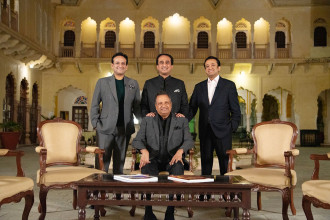-1712744097.jpeg)
KATHMANDU: The President of FNCCI Chandra Prasad Dhakal spoke at the opening ceremony of the 58th Annual General Assembly of the Federation of Nepalese Chambers of Commerce and Industry (FNCCI). It has been a year since he, along with a new executive committee took charge of FNCCI.
Speaking about the growth of the federation, he said, “Before I took the leadership of the FNCCI, my business, which started with just me and one or two friends and family members, has grown to a family of nearly 20,000. By joining the FNCCI, it became a family of around 600,000 entrepreneurs. There are also entrepreneurs who, for various reasons, are not or could not become members, and they are also members of this family. This means the FNCCI family is all members of the private sector.”
Emphasising the interdependence of the economy, he mentioned,” Our larger family is the entire country. The private sector is the income-generating members of this larger family. The government is the structure built to provide essential services and security to us, the private sector, and the general public. We cannot work without the services and security provided by the government. We pay taxes to the state in return for the services and security it provides.”
“Currently, there is a mismatch between income and expenditure in the family. The private sector, which bears the nation's expenses, is trying to spread its wings and earn more. However, it is unable to obtain the necessary services and security. The sector is currently seeking some encouragement, even if minimal, from the government.” , he said regarding the economic imbalances in the country.
Regarding the challenges of entrepreneurship, he said, ”I want to talk about the dreams of young people. I want to talk about entrepreneurship. Entrepreneurship is a difficult penance. Any new venture requires innovative thinking and ideas. Money is needed to implement them. Such funds often have to be raised by mortgaging homes. Then, this idea needs to be prepared in a way that society will accept it. Political leaders need to take ownership of it. There should be no legal hurdles and it should be environmentally sustainable. Only after all these fundamental aspects are met does a project or business become a reality.”
On the impact of government policies, he said, “Having put in so much effort to prepare a business or project, a single government policy, the whim of an official, or a crowd can destroy it in a moment. However, even with all this, I don't want to just express disappointment here today. I see this country as a land full of possibilities. I will also talk about the role of political leadership in turning these possibilities into reality.”
He emphasised the necessity to acknowledge economic realities. “To explore possibilities, a realistic picture of the current situation is necessary. Currently, foreign exchange reserves are at their highest level ever. This means it is enough to import goods and services for about 12 and a half months. Banks also have around 6 trillion rupees available to give as immediate loans. Due to the inability of entrepreneurs and businesses to expand their businesses, the demand for loans is low.
With a positive message as the balance of payments and current account are also in savings, there is a positive message. However, during this period, while one trillion rupees were exported, 80 billion rupees went out as students went abroad. Since Nepal became a member of the World Trade Organization, exports have increased by up to three times, while imports have increased by ten times.
Foreign investment is only around 0.2 percent of the Gross Domestic Product (GDP).
Foreign aid is continuously declining. Financial management expenses are almost double the capital expenditure. If domestic resources cannot be increased, there is a possibility that Nepal's burden of debt will further increase as it graduates from the status of a least developed country.”
Voicing his opinion on the country’s reliance on remittances, he said, “Even though exports, investment, and aid are all low, remittances are the reason the external sector is strong. We are all aware that remittances have been the mainstay of the country for decades. The possibility of remittances alone sustaining the economy continuously is low. In the past, rising remittances increased government revenue as demand increased. Currently, government revenue is not growing as expected. With low capital expenditure, the government's deficit indicates that the coming days will be more complex.”
Addressing the Prime Minister and Former Prime Ministers, he said, “I have presented the above statistics to inform you about the current state of our economy. Because I believe that only by accepting the fact that there are still problems in the economy can we find a way out. The sluggish economic situation for almost two years has worsened due to a lack of diagnosis and treatment. The private sector has repeatedly identified the problem and recommended solutions. However, due to the government's concerned parties' neglect, we have reached this critical juncture. Even the joint recommendations of the private sector for the budget and monetary policy this time were not implemented.”
Comparing Nepal’s situation to other countries in the region, he said, “Fearful of becoming another Sri Lanka, restrictive policies were implemented here. As a result, our economic growth has plummeted from 6% to 2%, while Sri Lanka's economic growth has gone from -7.8% to nearly positive 2% during the same period.
Internal factors are the primary reasons behind Nepal's weak economy, not external ones. This is because the growth rates of countries like India and Bangladesh have been high during this period. The World Bank has projected Nepal's economic growth for the current year to be only 3.3%. In contrast, Bangladesh and India are projected to grow at 5.6% and 7.5%, respectively. Last year too, when Nepal's growth was below 2%, India and Bangladesh's economies expanded by more than 6%.
The private sector-driven growth is the main pillar of development for countries like Bangladesh, Cambodia, Laos, Rwanda, and Ethiopia, not just India. These once conflict-ridden and impoverished nations have averaged over 6% growth in the past decade. Nepal, on the other hand, averages 4%.
The reason for the low economic growth in the last two years, while all our neighbours are experiencing rapid development, is that the private sector has not been able to function properly. This year, the growth rate of the production sector is negative by 0.4%. Industries are currently experiencing a kind of undeclared load shedding, further impacting production.”
Mr. Sanjeev Puri, President Designate CII participated in the event, who President Dhakal thanked for his presence. “FNCCI and CII have a long standing partnership and I would like to thank Mr. Puri for your presence.”
Commenting on the difficulties faced, he mentioned, "Easy loan options for small entrepreneurs have been halted. Payments to construction companies have been stalled. Capital expenditure is low. In such a situation, we need to find ways to increase production and money flow in the market. Since there is potential for service exports, our policies should also be directed towards that. Due to low revenue, businesses are facing problems due to unnecessary monitoring."
Addressing the Prime Minister, Party Leaders, and High-Level Leadership, he exclaimed, “Personally, I am someone who looks at every sector and effort positively. I avoid using the words "no," "cannot," and "will not" whenever possible. We are self-sufficient and capable. Because our economy is small, it is also easier to recover. Therefore, my opinion is that our strategies should be suited to our soil and situation, rather than any external influence. So, even today, I say - the small but positive efforts we take will yield significant results. This requires everyone's positive attitude and sincere efforts.
The Federation is taking the initiative to establish an investment company where small, scattered savings can be invested. This is not the Federation's own company. Initially, the Federation will facilitate the involvement of all businesses. The company will operate independently.
We are constantly making efforts from our side. We don't want the dreams of our youth to be wasted in the Gulf. Let's give entrepreneurs the opportunity to turn their passion into money. Barren hills and village soil can be made green again. For this too, the private sector of Nepal needs to be further encouraged. How did we rise after the earthquake? And how did we become strong after Covid? We can draw inspiration from these hardships as well. The country's private sector is ready to lead development and prosperity, only the environment is lacking.
Let's all work together to create this environment and strengthen the economy starting today. We have presented a five-point commitment paper here before you at this prestigious gathering today. We expect your commitment to this.
At a time when despair and distrust are rising, I only hope that your commitment to these pledges will send a positive message. I sincerely request you for this.”
Expressing his gratitude, he said, “The bilateral investment treaty (BIT) framework proposed by the Federation of Nepalese Chambers of Commerce and Industry (FNCCI) has been passed by the Cabinet. I express my gratitude to the Honourable Prime Minister for this. We also expect the 12 laws and regulations prepared by us for improvement to be passed soon.
Over a thousand entrepreneurs and businesspeople from across the country are gathered here today at this program. The political leadership and we have a lot of work to do to bring smiles to the faces of businesses and ordinary citizens. We need to turn this despair into hope. The new year 2081 BS is starting soon. Honourable Prime Minister, former Prime Ministers, the leadership - what message will we, the entrepreneurs, take from you into the new year? Now it is in your hands.”
-1712744097.jpeg)








